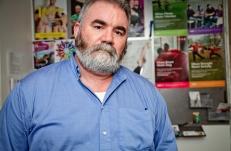Last month, ManCount revealed that one in 40 gay men in Vancouver are HIV-positive but don’t know it.
In 2008, the BC Centres for Disease Control found gay men account for 51 percent of all new HIV infections in BC; 62 percent for Vancouver.
The research has been done. The numbers are in. Adequate, targeted funding to roll out much-needed HIV-prevention programs is not.
Now 10 years old, the Community-Based Research Centre (CBRC), which co-conducted the ManCount study, still gets no core operational funding.
Though it does get some federal money from the Public Health Agency of Canada (PHAC), the amount varies from year to year and other groups compete for it, says the CBRC’s Dr Rick Marchand.
“It’s not a very good way to manage an epidemic,” Marchand argues. “There’s no consistent funding and there’s no collaborative planning.”
Yet in both provincial and federal policy documents, gay men are considered a priority population, Marchand points out.
“So you think, ‘Okay, you’re on the right track.’ However, it doesn’t translate into the funds and the initiatives.”
It’s what Marchand’s CBRC colleague Dr Terry Trussler dubs an “absence of mention.”
“The gay epidemic just is not talked about even amongst the institutional players,” Trussler says.
Marchand recalls the last call for tenders, in which every AIDS group in the region put in a bid for funding. “I know in the last call 15 got recommended. We put one in and it wasn’t recommended.”
Only after protesting did the CBRC eventually get its project in too, Marchand says.
“We don’t seem to do well in these kinds of committees or review panels,” Marchand says.
It’s as if the proposals to fund programs specifically aimed at gay men are somehow considered unworthy, Trussler says.
Marchand says the “squeamishness factor” shouldn’t be underestimated.
“When you’re talking constantly in proposals about anal sex and unprotected sex, for some people, they can’t consider these things,” he says.
“You wouldn’t want to give money to a group that you judge morally bad or not conforming,” Trussler suggests.
“We are amongst a group of researchers stretching around the world who are asking the question: is the absence of mention, is the institutional marginalization, the lack of coordination, the lack of collaboration or discussion even, is there a relationship [between] this kind of inattention and the rate with which gay men continue to be claimed by HIV?” Trussler wonders.
“That’s our open question.”
For HIM executive director Wayne Robert, the main frustration has been the long time lapses between applying for federal funding and getting notice of acceptance or rejection.
HIM waited 10 months for a reply to its request for funding to create an online resource for gay men in 2008.
HIM eventually learned its application was turned down, but no reason was given for the rejection. After writing federal Health Minister Leona Aglukkaq last January to find out what was wrong, Robert says he got a reply in May that told him just over $2 million was distributed “throughout the province to provide services to as many people as possible.”
Robert says it’s difficult to say that “strictly homo-negativity or hetero-normativity” leads to the dearth in federal funding for gay HIV initiatives.
The funding applications do exist, he points out. Still, he doesn’t rule out that kind of discrimination.
“Certainly, being a gay man and living in this world, that wouldn’t surprise me if that came up at some point, and be a problem for some individual in this chain of decision-making.”
Regardless, Robert says, the work has to go on with the resources available.
There are on average three new HIV infections per week, with the estimated cost to the healthcare system reaching into the hundreds of thousands of dollars over a lifetime, Robert says. “The amount of new HIV cases that occur in a week would cover the cost of HIM for a year,” he estimates.
“That’s what we find quite frustrating about this.”
Xtra managed to reach a PHAC spokesperson twice and was told both times that someone would be made available for an interview.
Despite leaving yet another voice message on Dec 13 requesting comment, no one from PHAC got back to us by posting time.


 Why you can trust Xtra
Why you can trust Xtra


